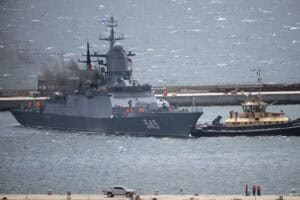Fraser has now implicated Ramaphosa's closest political advisor.

Former spy boss Arthur Fraser has divulged yet another set of revelations to President Cyril Ramaphosa’s Phala Phala farm saga.
Fraser’s claims earlier this year that Ramaphosa concealed a theft that happened at his Limpopo game farm in 2020 now include a second affidavit, City Press reports.
In the latest affidavit, said to have been filed in June in response to questions posed by the Hawks about where the cash came from, Fraser accused presidential advisor Benjani Chauke of being complicit in the alleged crime.
Fraser’s revelations come as no surprise, after they were laid out in Independent Media’s leaked ANC December elective conference coverage plan, titled Operation Hlanza.
The plan was reported on by News24, and authored by The Star‘s editor, Sifiso Mahlangu.
Coverage relating to Operation Hlanza in the lead-up to the conference has seen, among others, Nkosazana Dlamini-Zuma reported to being better suited for the job of president, and speculation on Ramaphosa being the ANC’s “last president in government”.
Where did the money come from?
Fraser supplemented his claim with the following response:
“In response to a question from the DPCI [Directorate for Priority Crime Investigation] investigators on where the money comes from, I advised that one of President Ramaphosa’s closest advisers, Bejani Chauke, was ostensibly instrumental in illegally bringing large sums of US dollars into South Africa for both he and the president after returning from trips he undertook on behalf of President Ramaphosa to various countries including, Saudi Arabia, Qatar, Egypt, Morocco and Equatorial Guinea.”
In the affidavit, Fraser claims Chauke hid the money.
ALSO READ: Phala Phala: Panel probing allegations against Ramaphosa to start on Wednesday
‘Hiding’ money
“Mr. Chauke is said to have concealed the undisclosed amount of US $ in one of his couches at his personal residence in Hyde Park, Johannesburg and with the assistance of Major General Rhoode, transferred the couch to the President’s residence at Phala Phala, with the full knowledge and acquiescence of the President.”
Fraser said an analysis of phone tower networks regarding Chauke and Rhoode would “shed some light hereon.”
Money not declared
Fraser also alleged the money was not declared to the South African Revenue Service or the South African Reserve Bank (SARB), and did not enter any formal banking system.
“It must further be established from the SARB whether the President and/or Phala Phala, and/or any of the President’s farming, animal or hunting entities had declared the possession of any foreign currency or any business transactions in foreign currency and/or had obtained any authorization from the Reserve Bank in this regard. Particularly, US $’s.”
“It must be established from SARS whether the President and/or Phala Phala, and/or any of the President’s farming, animal or hunting entities had declared any income through foreign currency, particularly US $ in the submission of business and personal tax returns for the period concerned,” Fraser alleged.
ALSO READ: ‘No conflict of interest’, says Presidency in defence of Ramaphosa’s Phala Phala interests
Not game sales?
In the affidavit, Arthur Fraser also argues that funds stolen during the Phala Phala investigation on February 2020, which Ramaphosa said was proceeds of game sales, is untrue.
He said he was also in the cattle and game business, in which he buys and sells animals. At times, Fraser said this is done in cash, or through transfers, locally or “offshore”.
“Some of the people are offshore customers and who are sometimes local, come through and buy animals. And some of them come also to hunt on the farm. So, this that is being reported is a clear business transaction of selling animals,” the affidavit read.
Witness statements
Fraser advised that the Hawks obtain witness statements from anyone at the Phala Phala farm responsible for business activities relating the sales and auctions of animals, as well as game hunting.
In addition, he said the elite police unit should look for statements from any of Ramaphosa’s associated entities where business activities took place between 1 March 2019 and 29 February 2020.




Independent panel into Phala Phala
City Press reported that presidential spokesperson Vincent Magwenya confirmed they were aware of Fraser’s latest affidavit, but declined to comment, owed to it forming part of the Hawks’ investigation.
Magwenya told The Citizen that the matter remained under investigation.
“Therefore, we won’t comment any further.”
In a media briefing at the Union Buildings in Pretoria on Tuesday, Magwenya insisted that there was no conflict of interest regarding Ramaphosa’s Phala Phala farm activities.
“Whilst the farming entities do trade in the purchase, sale and breeding of game and livestock, the president does not earn as a salary from these entities. Revenues earned from the trading of game and livestock covers the salaries of workers [and the rest is reinvested].
Magwenya also pointed out that Ramaphosa had declared his financial interests to Parliament as well as Cabinet’s secretary Phindile Baleni from 2014 to date.
Meanwhile, the independent panel tasked with probing Ramaphosa’s Phala Phala farm robbery saga officially commenced its work on 19 October.
The panel has 30 days to complete the mammoth task of making a recommendation on whether sufficient evidence exists to show Ramaphosa committed any violations related to the robbery at his farm.
Magwenya confirmed that Ramaphosa would submit his responses to the panel in the 10-day timeframe he has been given.
Additional reporting by Molefe Seeletsa.
ALSO READ: ‘Your president is corrupt’: Zuma rants about ‘injustice’, Zondo, load shedding and Ramaphosa
Support Local Journalism
Add The Citizen as a Preferred Source on Google and follow us on Google News to see more of our trusted reporting in Google News and Top Stories.






